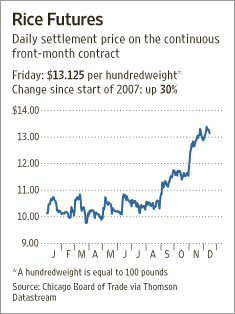The Price of Rice
 When I read this post by one of the associate bloggers at Joe Gandelman’s The Moderate Voice, it piqued my interest. The post quotes briefly from this New York Times article about possible unrest from the sharp rise in the price of rice that’s gone on recently:
When I read this post by one of the associate bloggers at Joe Gandelman’s The Moderate Voice, it piqued my interest. The post quotes briefly from this New York Times article about possible unrest from the sharp rise in the price of rice that’s gone on recently:
HANOI — Rising prices and a growing fear of scarcity have prompted some of the world’s largest rice producers to announce drastic limits on the amount of rice they export.
The price of rice, a staple in the diets of nearly half the world’s population, has almost doubled on international markets in the last three months. That has pinched the budgets of millions of poor Asians and raised fears of civil unrest.
Shortages and high prices for all kinds of food have caused tensions and even violence around the world in recent months. Since January, thousands of troops have been deployed in Pakistan to guard trucks carrying wheat and flour. Protests have erupted in Indonesia over soybean shortages, and China has put price controls on cooking oil, grain, meat, milk and eggs.
Food riots have erupted in recent months in Guinea, Mauritania, Mexico, Morocco, Senegal, Uzbekistan and Yemen. But the moves by rice-exporting nations over the last two days — meant to ensure scarce supplies will meet domestic needs — drove prices on the world market even higher this week.
Reports of the increases in prices are various. The graph on the right, gleaned from the WSJ, reports a more than 30% increase in rice futures in 2007. This article reports a whopping 60% increase in the price of rice on world markets from March of 2007 to March of 2008.
What could cause such a sharp increase?
The NYT article suggests several reasons for the increase
- Increased demand due to greater affluence in China and India
- Reduced output by some growers due to poor weather conditions.
- Farmers abandoning rice production for more profitable crops.
- Reduction in acreage devoted to rice due to urbanization.
Unfortunately, the article doesn’t attempt to quantify any of these costs nor to identify which factors are more important than others.
One additional obvious factor would be the rising cost of petroleum which influences several aspects of rice production including transportation costs, the cost of mechanized cultivation, and the cost of fertilizer. The price of oil has nearly doubled since its January 2007 price of $50 per barrel. Major rice consuming countries including China, India, and Pakistan all subsidize oil consumption, i.e. the price at which gasoline is sold is below the world price and the respective governments of these countries pick up the tab. Egypt has only recently abandoned oil subsidies. Oil subsidies are a commonplace in many rice consuming countries in Africa and the Middle East.
Ironically, these subsidies render the countries more vulnerable to increases in the world price of petroleum since it encourages more petroleum-intensive means of production than might otherwise be the case.
However, rice isn’t made of oil. However important its cost is to rice production I wouldn’t think that the increase in the price of oil would lead to such a dramatic increase and, indeed, reports like this one from India and this one from Pakistan suggest that the cost of oil amounts to 25% or less of the cost of rice cultivation. This report from South Korea suggests that the cost of oil contributes 10% or less.
While I might imagine a combination of all of the factors above producing a 30% price increase within a year, I’m skeptical that they could produce a 60% increase, particularly as world rice production continues to increase.
What other factors might be involved? One possibility that I think might be considered is that government policy, both in net rice consuming and net rice producing countries is influencing rice production and prices. All of the major rice consuming countries have a labyrinth of price controls, import duties or bans, export taxes or bans, and rice storage policies that have the specific intent of influencing prices. While this is politically prudent it’s also inevitable that these policies will have unforeseen secondary effects.
Also, nowadays knowledge of world market prices reaches even the most remote corners of the world:
At the same time, prices set in international rice trading now have an increasingly important effect on prices within countries. This has been particularly true in an age of Internet and mobile phone communications when even farmers in remote areas can learn about distant prices and decide whether their own buyers are giving them a fair price.
Could hoarding or a modern equivalent be a factor?
Lest we be too self-satisifed with our own position and the prospect of American rice farmers benefiting from higher prices on the world market, I doubt that will happen. One consequence of our own government’s lax policies is that genetically-modified strains of rice that have been banned in many countries have escaped from test plots here and have infected no one knows how many rice fields in the United States. Lots of rice-consuming countries, whether motivated by a policy of “food independence”, fears of genetically-modified crops, or just plain opposition to imports, have regulations that prohibit rice from the United States from being imported without having been certified as free of unapproved GM strains. This, in turn, raises the cost of American rice and renders us less competitive.
In the end I have fewer answers than questions and close with the question I asked above. Why is the price of rice rising?






In the states we have several reasons for price increases. Rice is a very oil dependent crop, multiple cultivations, multiple applications of herbicides and fertilizers (oil based as well as dependent on tractors or aircraft for distribution), reductions in available water supplies (lower water tables and pumping with diesel or natural gas powered pumps), crop land being turned into subdivisions (mainly Texas), and competition from other pricier and easier to grow crops (wheat and soybeans). Internationally, we have Australia out of the market due to drought, reduced crops in other areas like Argentina and increasing demand from nations that have had reductions in harvests and increases in demand due various reasons. As to our exports, we are something like #3 in the world behind Thailand and Vietnam. Most of our exports are sent to central and south American countries and the Caribbean basin nations. We also export a lot of rice to Iraq, Saudi Arabia, Turkey and we donate to African nations and other nations (look at the USDA export reports and the number of nations buying US rice is larger than you think). I hope this helps answer some of your questions. If not email me some more specific questions and I will see if I can give you the answers. MPW
Hell if they don’t want our GM rice, we’ll just have to eat it ourselves, but no financial aid to the starving so they can purchase other people’s rice adding to the shortage.
I wonder what the Donner party would have done with genetically modified food?
… but say NOTHING about the cost of transporting it. Nor do they account for the costs of support items such as cost of ferilizer, and shipping THAT, which also, of course, requires oil.
But before we get too isolated on the price of rice, perhaps we ought to look at the costs of food as a whole, which is also going up by similar amounts.
And that, too, is tied to the price of oil. How much of the move toward more profitable crops, as you say, is to grow corn for ethenol, which in turn is being driven by huge governmental subsidies?
And to think this whole chain of events is being driven by a myth of global warming.
Just throwing out some basic speculation here. As Bithead notes, all grain prices are increasing at very large rates (50%+ per year) Hoarding right now does not look likely as the global supplies of other grains and near substitutes are at or approaching historical lows, so potentially the threat of a supply run is increasing prices. Throw in a weaker US dollar so dollar denominated future contracts will increase in nominal price (I wonder what these charts look like in Euro or Yen?) and increase in fertilizer prices, transportation costs, and demand….
While global inventories have been shrinking the hoarding I’m thinking about is by the growers themselves.
It seems to me that growers who are aware of the disparity between world market prices and the fiat prices under which they’re operating are likely to take some kind of action in the hopes of driving the price they’re getting closer to world prices. Those measures, in turn, could drive prices up farther and faster than they might otherwise rise.
Is it hoarding if they hold back their crops to increase their profit? Farmers in most of the world stuggle under distribution systems that cause them great harm in pricing of crops, now for the first time in a long time the prices being paid for ON farm grains are rising, so the farmers that don’t have to sell immediately and can wait to sell in a rising market are. Hoarding is, in my opinion, too harsh a word for the farmers in this instance. Government owned stocks in Thailand and elsewhere are “held” for times such as these, are these governments “hoarding” if they don’t release all their stocks now, but straggle them out or wait until the stiuation becomes more severe to release them? MPW
Yes, that’s pretty much the definition of “hoarding”. I’m not faulting them for it and I agree with you about the problems caused by laws, regulations, tariffs, quotas, and bans.
And when governments store grain, that’s hoarding, too.
Again, that’s just definitional. The connotations you’re applying are yours.
Depends. Are we talking Fava beans, here?